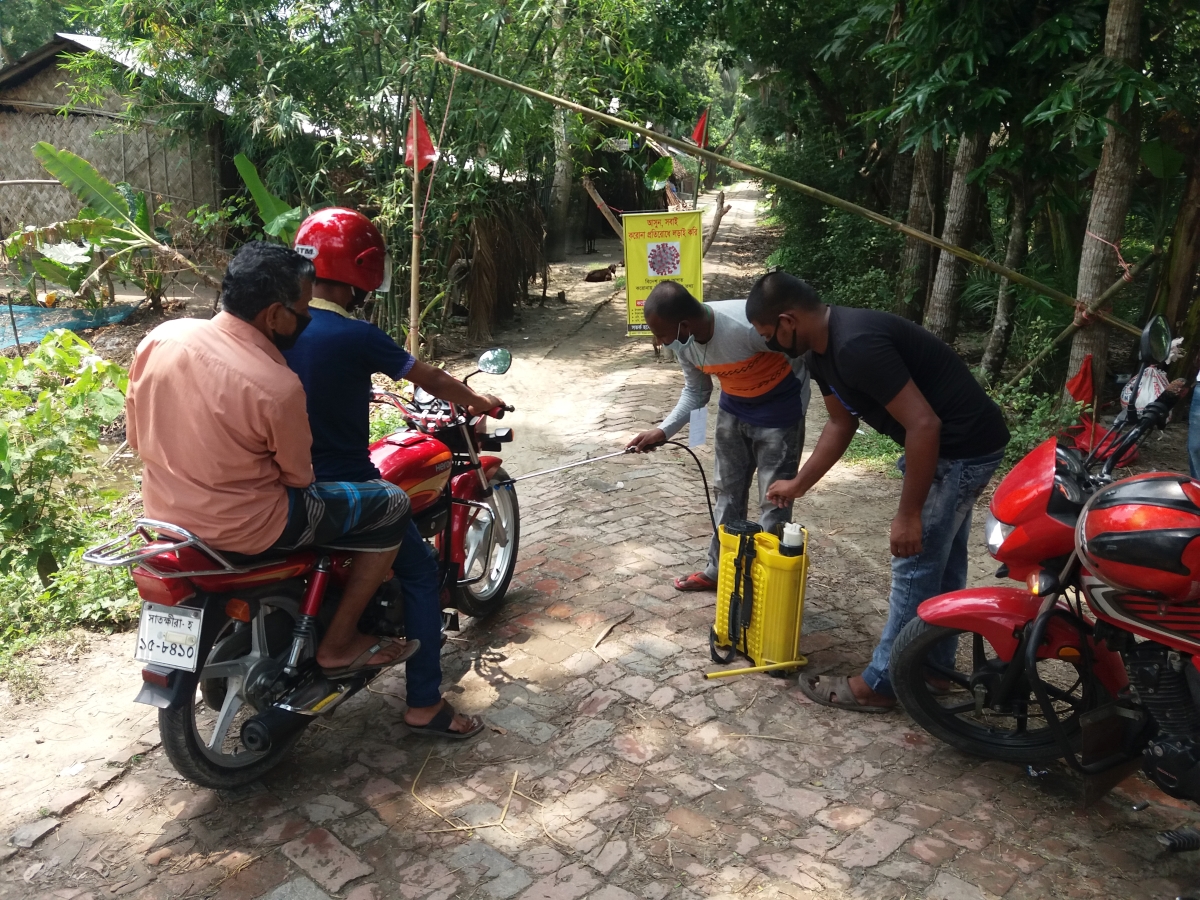Shonnasgacha is a small village of Keshobpur Upazila of Jashore district where 210 families live in a 1.5 sq. km area. While the country was waking up to the COVID-19 threat in the early stages of the lockdown, the locals of Shonnasgacha village took measures to protect themselves.
“We realised very early on that not many people will come to our aid so we had to take matters into our own hands. We knew that being united and supporting each other would help us overcome this pandemic”
Mr Hashem Ali Fakir, a retired professor and permanent resident of Shonnasgacha.
Bangladesh went into a countrywide lockdown towards the end of March and to date, there have been 811 deaths and more than 60,000 confirmed patients according to Bangladesh’s Institute of Epidemiology Disease Control & Research (IEDCR), most of these in the capital city of Dhaka. The country has reopened but the number of cases is growing with 367 confirmed cases per million population and with a relatively low number of tests, the numbers reflect only the tip of the iceberg.
The bulk restrictions were hard to take for the inhabitants of Shonnasgacha – no school, no work, no social events or public gathering. The first few days were bearable but things started getting worse as loss of income had a cascading effect with other problems surfacing. Yet, the people of Shonnasgacha came to each other’s aid. In early April, they pooled in a small amount of money and bought soaps, masks, spray bottles and bleaching powder for all 210 families from the village. Mr Fakir simultaneously contacted the local NGO Uttaran for home quarantine guidelines and requested for emergency health information leaflets.
From the onset, Uttaran kept close contact with Mr Fakir and the people of Shonnergacha, as they realised the potential longevity of these collaborative efforts at the community level. In response to COVID-19, Uttaran was implementing a project titled “Emergency Response for COVID-19 in Satkhira and Jashore district" with funding support from Start Fund Bangladesh (SFB) and UK Aid. They informed the SFB secretariat about this initiative and expressed an interest to support this localised initiative with the unspent money from the project.
Ring and slab to install separate temporary toilet for COVID-19 suspected/ affected/ quarantined people at Shonnergacha Village in Keshobpur Upazila
Uttaran asked the locals to form a committee and discussed the plan of action with them. The immediate step was to restrict the main entrances to the village and install handwashing points there. Seven people arriving from Dhaka, Narayanganj and other nearby COVID-19 hotspots, were kept in home quarantine. On Uttaran’s advice, those in home quarantine were provided with separate latrines. This particular feature is hard to maintain in a rural setting, but from fear of the infection spreading, community members made this provision.
Point of entry to the Shonnergacha Village at Keshobpur Upazila, with the newly installed bamboo gate and the red banner stating “For Corona prevention: outsiders cannot enter”
Uttaran also made the committee members aware of an upcoming countrywide food crisis, which could further affect the ongoing shortage of resources. The committee responded to this by creating a food bank.
“Initially we were not sure how people would respond, but it has been overwhelming so far. Many have promised to give money and others promised to share rice from their ongoing harvests”, Mr Fakir mentioned.
Uttaran decided to match the value of whatever had been collected by the locals, in cash. The first task was to collect cash or in-kind items, food items, then to jointly decide on buying and storing the required amount of rice, lentils, salt, oil, potatoes etc. from the local market.
Another issue the village committee dealt with, was stigmatising and signalling out the potentially infected people, caused by the influx of information on the latest developments and extreme cases during the pandemic. This was triggering negative reactions like avoiding the correct procedures, as per the World Health Organisation (WHO) / Bangladesh’s Institute of Epidemiology Disease Control & Research (IEDCR) guidelines and spread of misinformation. Furthermore, people were unaware of the burial procedures of the deceased, which led to more apprehension and confusion. So far, there have been no deaths in the village but this called for more focused awareness-raising, prompting Uttaran to share online materials with some adolescents and the Imam of the local mosque, instructing them on handling dead bodies during the pandemic. Uttaran also decided to supply body bags for anyone passing away due to COVID-19 or similar symptoms.
The people of Shonnasgacha, especially social leaders like Mr Fakir inspired four adjacent villages. Paani Committee (a local community-based organisation network working for their rights to water) are preparing to follow the footsteps of Shonnasgacha village, making them a true example of the collaborative and localised efforts, targeting a global issue like a pandemic.

